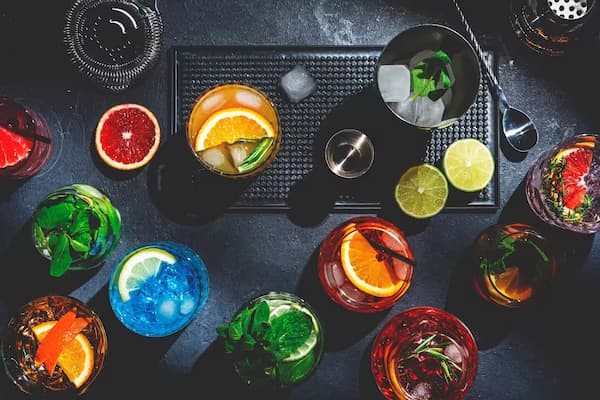Whiskey
With Whiskey you can make
Raspberry Lynchburg
Blackberry Bramble
Dolcevita
Shamrock
Scotch Whisky Highball
Christmas Cake Martini
Cameron's Kick
Smokestack Lightning
We've got 372 cocktails that can be made with Whiskey.
Find out what to make with Whiskey
Q&A
What is the origin and history of whiskey?
Whiskey's origins trace back several centuries, with its invention often disputed between the Irish and the Scots. Both countries have records of distilling spirits that date back to the 15th century, though it is possible that the practice began even earlier. Historically, whiskey was first distilled by monks in Ireland or Scotland as a medicinal elixir. Over time, it evolved from a rudimentary spirit into the complex and highly nuanced drink known today. As whiskey spread globally, various styles and production methods were developed, leading to the rich diversity of whiskey types available in the modern market.
What are some common substitutions for whiskey in cocktails?
Substituting whiskey in a cocktail depends on the whiskey's role and the desired flavor profile. For a non-alcoholic option, a mixture of tea (depending on the whiskey's origin), apple cider vinegar, and non-alcoholic vanilla extract can mimic some whiskey characteristics. For alcoholic substitutes, consider the type of whiskey the recipe calls for: use brandy or dark rum as substitutes for bourbon, or try using cognac if Scotch whiskey is required. Each substitute brings a unique flavor twist but maintains a similar spirit-forward character.
How should whiskey be prepared for use in cocktails?
Preparing whiskey for cocktails involves selecting the right type for the drink and measuring the proper amount. Use a jigger for accuracy. If the cocktail requires a smooth and softer whiskey, consider an Irish whiskey or a well-aged bourbon. For cocktails needing a bold flavor, choose a full-bodied rye or a peaty Scotch. Chilling whiskey before mixing is not necessary, as most cocktails balance the whiskey's flavor profile with ingredients like ice, syrups, or citrus, which are added during the mixing process.
What are some popular cocktails that feature whiskey, and how are they served?
Popular whiskey cocktails include the Old Fashioned, served over ice and garnished with an orange peel and a cherry; the Manhattan, typically served up in a cocktail glass with a maraschino cherry; the Whiskey Sour, served either on the rocks or straight up with a citrus slice and a cherry; and the Mint Julep, served in a metal cup packed with crushed ice and garnished with fresh mint. Each cocktail enhances different aspects of whiskey's complex flavor profile and is served in a way that complements its characteristics.
What role does whiskey play in cultural traditions?
Whiskey holds a significant place in many cultures, symbolizing hospitality, celebration, and tradition. In Scotland and Ireland, whiskey is central to occasions such as weddings and holidays, often used to toast to health and prosperity. In the United States, particularly in Kentucky, bourbon has historic and economic importance, with the Kentucky Bourbon Festival celebrating this heritage annually. Japanese whiskey, drawing inspiration from Scottish methods, has also become a symbol of craftsmanship and innovation. Across cultures, sharing a bottle of whiskey is a gesture of welcome and fraternity.
Whiskey Brands
Ingredients like Whiskey
Other Whiskey / whiskies
How it works
Easily create your bar from the ingredients you have at home, and we'll show you what you can make with the ingredients you have to hand.
Once you've added this ingredient head to your My bar page and fill up everything else you have.
We'll also show you cocktails that can make by substituting what you have for one of the ingredients you don't, riffing on the original. Now go forth and create something delicious!







